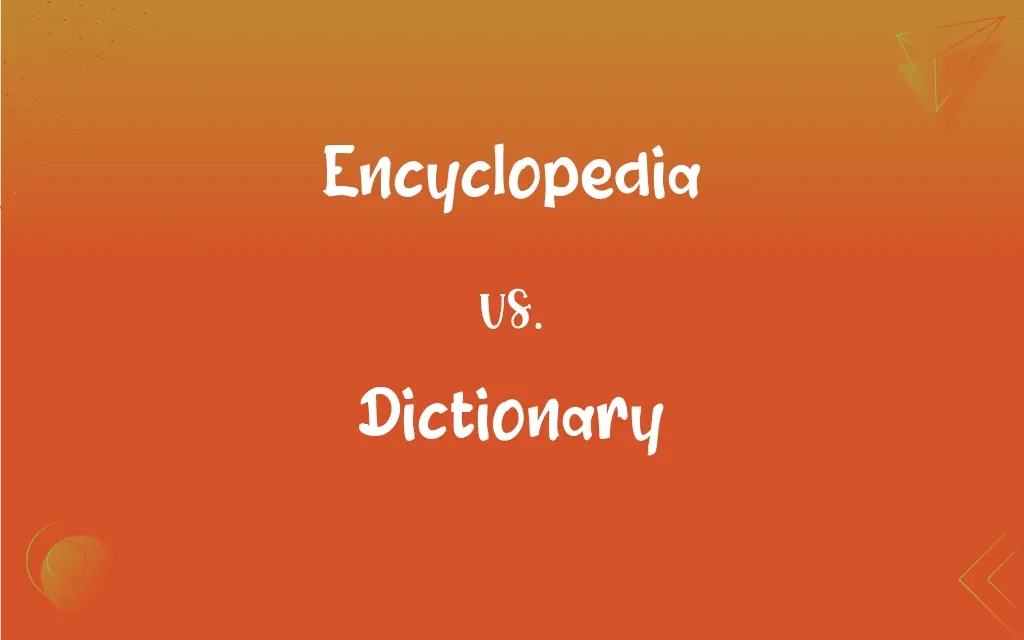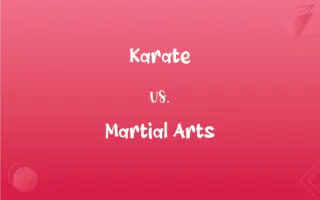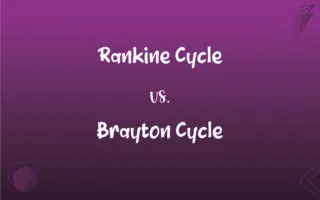Encyclopedia vs. Dictionary: What's the Difference?
Edited by Aimie Carlson || By Janet White || Published on January 1, 2024
An encyclopedia is a comprehensive reference work providing detailed information on a wide range of subjects, while a dictionary is a reference book listing words with their meanings, usage, etymology, and phonetic pronunciations.

Key Differences
An encyclopedia contains detailed articles on various topics, offering in-depth information, context, and analysis. It covers a wide array of subjects, from history to science, and often includes images and references. A dictionary, on the other hand, is a collection of words in a specific language, providing definitions, pronunciations, etymologies, and usage examples. It focuses solely on words and their meanings, without delving into broader subject matter.
Encyclopedias are used for research and gaining a comprehensive understanding of a topic, often serving as a starting point for in-depth study. They are ideal for learning about specific subjects in detail. Dictionaries are essential for understanding language, learning new words, their correct pronunciation, and usage. They are frequently used by writers, students, and linguists for language reference.
Encyclopedias are organized either thematically or alphabetically, containing long, detailed articles, often written by experts. These articles are comprehensive, covering not just definitions but historical context, significance, and related information. Dictionaries are alphabetically arranged, listing words with their meanings, phonetic transcriptions, parts of speech, and sometimes example sentences. They focus on brevity and clarity in definitions.
The scope of an encyclopedia is broad, covering a vast range of topics in considerable depth. It provides a macro view of subjects, offering insights and background information. In contrast, a dictionary has a micro focus, concentrating on individual words and their specific meanings, pronunciation, and usage, without providing contextual or in-depth subject information.
Encyclopedias have evolved into comprehensive digital platforms, with multimedia content and interactive features, while still maintaining print versions. They are regularly updated to include the latest information across various fields. Dictionaries have also embraced digital formats, offering online and app-based versions for ease of use, with updates incorporating new words and phrases that reflect changes in language and culture.
ADVERTISEMENT
Comparison Chart
Content
Detailed articles on a wide range of topics.
Definitions of words, their pronunciation, usage.
Purpose
To provide in-depth information on various subjects.
To offer meanings and usage of individual words.
Organization
Alphabetical or thematic, with lengthy articles.
Alphabetically arranged words with definitions.
Usage in Language
For research and comprehensive understanding.
For language reference and learning new words.
Format and Evolution
Both print and digital, often updated.
Available in print, online, and app forms.
ADVERTISEMENT
Encyclopedia and Dictionary Definitions
Encyclopedia
An encyclopedia is a comprehensive reference work offering detailed information on a wide range of subjects.
The encyclopedia was invaluable for her research on ancient civilizations.
Dictionary
A dictionary is a reference book listing words of a language with their meanings and pronunciation.
She used the dictionary to find the meaning of 'obfuscate.'
Encyclopedia
An encyclopedia is a reference book or digital resource containing in-depth articles on various topics.
The school library's encyclopedia set was frequently used by students for their projects.
Dictionary
A dictionary is a resource for understanding the meaning, pronunciation, and usage of words.
The dictionary app on her phone was convenient for quick word look-ups.
Encyclopedia
An encyclopedia is a collection of knowledge, often in the form of articles, covering numerous topics.
He spent hours browsing the encyclopedia to quench his thirst for knowledge.
Dictionary
A dictionary catalogs the words of a language, providing their meanings and etymological origins.
He was fascinated by the etymology of words in the historical dictionary.
Encyclopedia
An encyclopedia is an assembled work of expert knowledge on various subjects, often including illustrations.
The illustrated encyclopedia helped children understand complex scientific concepts.
Dictionary
A dictionary is a compilation of words and their definitions, often including part of speech and usage.
His English improved significantly after he started reading the dictionary daily.
Encyclopedia
An encyclopedia is a compendium of information, providing insights into various subjects.
The online encyclopedia became his go-to source for historical facts.
Dictionary
A dictionary is a linguistic reference that includes word definitions, pronunciations, and examples.
The pocket dictionary was a handy tool for travelers learning new languages.
Encyclopedia
A comprehensive reference work containing articles on a wide range of subjects or on numerous aspects of a particular field, usually arranged alphabetically.
Dictionary
A reference work containing an alphabetical list of words, with information given for each word, usually including meaning, pronunciation, and etymology.
Encyclopedia
A comprehensive reference work (often spanning several printed volumes) with articles (usually arranged in alphabetical order, or sometimes arranged by category) on a range of subjects, sometimes general, sometimes limited to a particular field.
I only use the library for the encyclopedia, as we’ve got most other books here.
His life's work is a four-volume encyclopedia of aviation topics.
Encyclopedia
(dated) The circle of arts and sciences; a comprehensive summary of knowledge, or of a branch of knowledge.
Encyclopedia
The circle of arts and sciences; a comprehensive summary of knowledge, or of a branch of knowledge; esp., a work in which the various branches of science or art are discussed separately, and usually in alphabetical order; a cyclopedia.
Encyclopedia
A reference work (often in several volumes) containing articles on various topics (often arranged in alphabetical order) dealing with the entire range of human knowledge or with some particular specialty
FAQs
Can encyclopedias be used for academic research?
Yes, they are valuable resources for academic research, providing a broad understanding of various topics.
Are modern dictionaries available online?
Yes, many dictionaries have online versions and mobile apps for easy access.
How is an encyclopedia different from a dictionary?
An encyclopedia provides in-depth information on subjects, while a dictionary focuses on word meanings and language specifics.
What is a dictionary?
A book or digital resource listing words of a language with their meanings, pronunciation, and usage.
How often are dictionaries updated?
Print dictionaries are updated periodically, while online dictionaries are updated more frequently to include new words and meanings.
Do encyclopedias contain information about current events?
Some encyclopedias, especially online versions, include current events and recent developments.
Can encyclopedias be biased?
While they strive for neutrality, some encyclopedias can reflect biases, depending on their authors and sources.
Can dictionaries help improve language skills?
Yes, regularly using a dictionary can significantly improve vocabulary and understanding of a language.
What is an encyclopedia?
A comprehensive reference work containing detailed information on a wide range of subjects.
Do encyclopedias include images?
Yes, many encyclopedias include images, diagrams, and sometimes videos to complement the text.
Are encyclopedias suitable for children?
Yes, there are encyclopedias specifically designed for children with simplified content and illustrations.
Are there specialized dictionaries for different fields?
Yes, there are dictionaries for specific fields like law, medicine, and science.
How are encyclopedias organized?
Encyclopedias are usually organized alphabetically or thematically, with articles on various topics.
What is the difference between a thesaurus and a dictionary?
A thesaurus lists synonyms and antonyms, while a dictionary provides definitions and pronunciations.
Do dictionaries include slang words?
Many modern dictionaries include slang words and colloquial expressions.
Are there digital encyclopedias?
Yes, many encyclopedias are available in digital format, offering interactive content and frequent updates.
How do dictionaries handle different dialects?
Comprehensive dictionaries often include variations in word usage and pronunciation across different dialects.
Are there dictionaries for sign languages?
Yes, there are specialized dictionaries for various sign languages.
Do encyclopedias cover fictional topics?
Some encyclopedias cover fictional universes, especially those related to popular culture and literature.
Can I contribute to an encyclopedia?
Some online encyclopedias allow public contributions, but these are usually reviewed by editors.
About Author
Written by
Janet WhiteJanet White has been an esteemed writer and blogger for Difference Wiki. Holding a Master's degree in Science and Medical Journalism from the prestigious Boston University, she has consistently demonstrated her expertise and passion for her field. When she's not immersed in her work, Janet relishes her time exercising, delving into a good book, and cherishing moments with friends and family.
Edited by
Aimie CarlsonAimie Carlson, holding a master's degree in English literature, is a fervent English language enthusiast. She lends her writing talents to Difference Wiki, a prominent website that specializes in comparisons, offering readers insightful analyses that both captivate and inform.































































